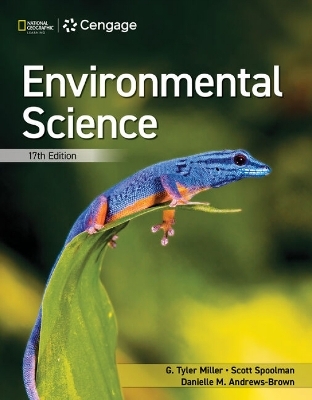
Environmental Science
Brooks/Cole (Verlag)
978-0-357-97631-9 (ISBN)
G. Tyler Miller has written 65 editions of textbooks for introductory courses in environmental science, basic ecology, energy and environmental chemistry. Since 1975, his books have been among the most widely used textbooks for environmental science in the United States and throughout the world. Translated into eight languages, they have been used by more than 3 million students. Dr. Miller has a professional background in chemistry, physics and ecology. He taught college for 20 years, developed one of the nation's first environmental studies programs and created an innovative interdisciplinary undergraduate science program before deciding to write environmental science textbooks full time in 1975. Now retired, Dr. Miller created Earth Education and Research, an enterprise that was devoted to improving environmental education. He has a Ph.D. from the University of Virginia and has received honorary doctoral degrees in recognition of his significant contributions to environmental education. Scott Spoolman is an experienced writer in the field of educational publishing, with more than 30 years of expertise. Between 2003 and 2018, he worked with Tyler Miller as a co-author on editions of LIVING IN THE ENVIRONMENT, ENVIRONMENTAL SCIENCE and SUSTAINING THE EARTH. With Norman Myers, he co-authored ENVIRONMENTAL ISSUES AND SOLUTIONS: A MODULAR APPROACH. Spoolman has authored numerous books and articles in the fields of environmental science, geology and natural history, politics and business. Additionally, he has served as a consulting editor, contributing to the development of over 70 college and high school textbooks in the natural and social sciences. He earned a master's degree in science journalism from the University of Minnesota. In his free time, Spoolman enjoys exploring the forests and waters of his native Wisconsin along with his family -- his wife, environmental educator Gail Martinelli, son Will and daughter Katie. G. Tyler Miller has written 65 editions of textbooks for introductory courses in environmental science, basic ecology, energy and environmental chemistry. Since 1975, his books have been among the most widely used textbooks for environmental science in the United States and throughout the world. Translated into eight languages, they have been used by more than 3 million students. Dr. Miller has a professional background in chemistry, physics and ecology. He taught college for 20 years, developed one of the nation's first environmental studies programs and created an innovative interdisciplinary undergraduate science program before deciding to write environmental science textbooks full time in 1975. Now retired, Dr. Miller created Earth Education and Research, an enterprise that was devoted to improving environmental education. He has a Ph.D. from the University of Virginia and has received honorary doctoral degrees in recognition of his significant contributions to environmental education. Danielle M. Andrews-Brown is an Associate Professor and currently serves as the Interim Chair in the Department of Agriculture at Virginia State University. With a background in environmental soil science, Danielle obtained her Ph.D. from The Pennsylvania State University in 2011 and continued her work there as a Post-Doctoral Scholar and Research Associate. Danielle then transitioned to Program Lead for Environmental Studies and Assistant Dean/Academic Integrity Office at the University of Pittsburgh from 2017 to 2022 before coming to Virginia State University. For over 15 years, Danielle has conducted research related to water and soil quality for environmental restoration at three nationally known research sites -- Savannah River Site, The Susquehanna Shale Hill Critical Zone Observatory (CZO) and The Living Filter. Her research has particularly focused on carbon, nitrogen and emerging contaminants. Recently, Danielle's research interests have shifted toward informal and formal science education. For 20 years, Danielle has taught and advised a variety of middle school, high school, undergraduate and graduate students in both residential and online science-based courses. Scott Spoolman is an experienced writer in the field of educational publishing, with more than 30 years of expertise. Between 2003 and 2018, he worked with Tyler Miller as a co-author on editions of LIVING IN THE ENVIRONMENT, ENVIRONMENTAL SCIENCE and SUSTAINING THE EARTH. With Norman Myers, he co-authored ENVIRONMENTAL ISSUES AND SOLUTIONS: A MODULAR APPROACH. Spoolman has authored numerous books and articles in the fields of environmental science, geology and natural history, politics and business. Additionally, he has served as a consulting editor, contributing to the development of over 70 college and high school textbooks in the natural and social sciences. He earned a master's degree in science journalism from the University of Minnesota. In his free time, Spoolman enjoys exploring the forests and waters of his native Wisconsin along with his family -- his wife, environmental educator Gail Martinelli, son Will and daughter Katie.
Part 1. HUMANS AND SUSTAINABILITY: AN OVERVIEW.
1. The Environment and Sustainability.
Part II. ECOLOGY AND SUSTAINABILITY.
2. Science, Matter, Energy and Systems.
3. Ecosystems: What Are They and How Do They Work?
4. Biodiversity and Evolution.
5. Species Interactions, Ecological Succession and Population Control.
6. The Human Population and Urbanization.
7. Climate and Ecosystem Biodiversity.
Part III. SUSTAINING BIODIVERSITY.
8. Sustaining Biodiversity: Saving Species.
9. Sustaining Biodiversity: Saving Ecosystems.
Part IV. SUSTAINING RESOURCES AND ENVIRONMENTAL QUALITY.
10. Food Production and the Environment.
11. Water Resources and Water Pollution.
12. Geology and Nonrenewable Mineral Resources.
13. Energy Resources.
14. Environmental Hazards and Human Health.
15. Air Pollution, Climate Change and Ozone Depletion.
16. Solid and Hazardous Waste.
Part V. SUSTAINING HUMAN SOCIETIES.
17. Environmental Economics, Politics and Worldviews.
Appendix A: United Nations Sustainable Development Goals.
Appendix B: Chemical Elements, Ions, and Compounds with Environmental Significance.
Glossary.
Index.
Preface.
About the Authors.
From the Authors.
Learning Skills.
| Erscheinungsdatum | 06.04.2024 |
|---|---|
| Verlagsort | CA |
| Sprache | englisch |
| Maße | 215 x 277 mm |
| Gewicht | 1202 g |
| Themenwelt | Sonstiges ► Geschenkbücher |
| Naturwissenschaften ► Biologie ► Ökologie / Naturschutz | |
| ISBN-10 | 0-357-97631-2 / 0357976312 |
| ISBN-13 | 978-0-357-97631-9 / 9780357976319 |
| Zustand | Neuware |
| Haben Sie eine Frage zum Produkt? |
aus dem Bereich


